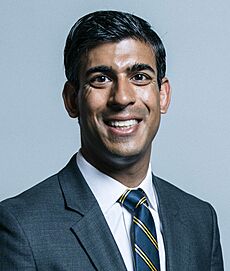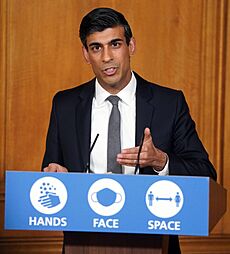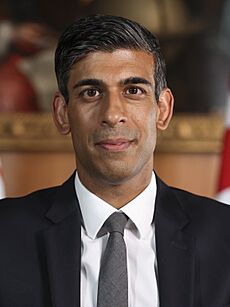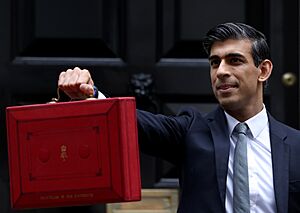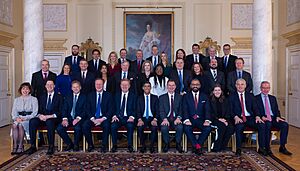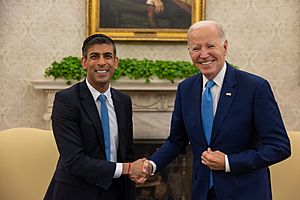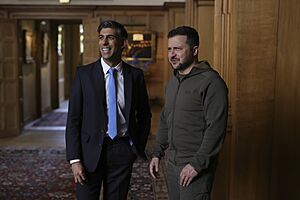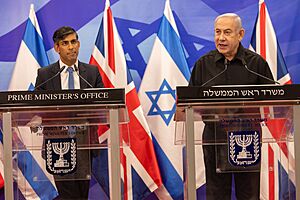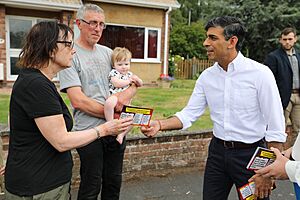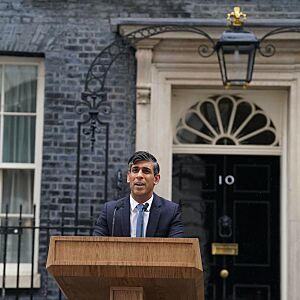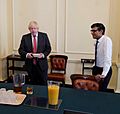Rishi Sunak facts for kids
Quick facts for kids
Rishi Sunak
|
|||||||||||||||||||||||||||||||||||
|---|---|---|---|---|---|---|---|---|---|---|---|---|---|---|---|---|---|---|---|---|---|---|---|---|---|---|---|---|---|---|---|---|---|---|---|
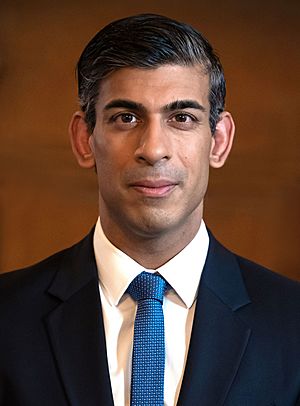
Official portrait, 2022
|
|||||||||||||||||||||||||||||||||||
| Prime Minister of the United Kingdom | |||||||||||||||||||||||||||||||||||
| In office 25 October 2022 – 5 July 2024 |
|||||||||||||||||||||||||||||||||||
| Monarch | Charles III | ||||||||||||||||||||||||||||||||||
| Deputy | |||||||||||||||||||||||||||||||||||
| Preceded by | Liz Truss | ||||||||||||||||||||||||||||||||||
| Succeeded by | Keir Starmer | ||||||||||||||||||||||||||||||||||
| Leader of the Opposition | |||||||||||||||||||||||||||||||||||
| In office 5 July 2024 – 2 November 2024 |
|||||||||||||||||||||||||||||||||||
| Monarch | Charles III | ||||||||||||||||||||||||||||||||||
| Prime Minister | Keir Starmer | ||||||||||||||||||||||||||||||||||
| Deputy | Oliver Dowden | ||||||||||||||||||||||||||||||||||
| Preceded by | Keir Starmer | ||||||||||||||||||||||||||||||||||
| Succeeded by | Kemi Badenoch | ||||||||||||||||||||||||||||||||||
| Leader of the Conservative Party | |||||||||||||||||||||||||||||||||||
| In office 24 October 2022 – 2 November 2024 |
|||||||||||||||||||||||||||||||||||
| Preceded by | Liz Truss | ||||||||||||||||||||||||||||||||||
| Succeeded by | Kemi Badenoch | ||||||||||||||||||||||||||||||||||
|
|||||||||||||||||||||||||||||||||||
| Member of Parliament for Richmond and Northallerton |
|||||||||||||||||||||||||||||||||||
| Assumed office 7 May 2015 |
|||||||||||||||||||||||||||||||||||
| Preceded by | William Hague | ||||||||||||||||||||||||||||||||||
| Majority | 12,185 (25.1%) | ||||||||||||||||||||||||||||||||||
| Personal details | |||||||||||||||||||||||||||||||||||
| Born | 12 May 1980 Southampton, Hampshire, England |
||||||||||||||||||||||||||||||||||
| Political party | Conservative | ||||||||||||||||||||||||||||||||||
| Spouse |
Akshata Murty
(m. 2009) |
||||||||||||||||||||||||||||||||||
| Children | 2 | ||||||||||||||||||||||||||||||||||
| Relatives |
|
||||||||||||||||||||||||||||||||||
| Education |
|
||||||||||||||||||||||||||||||||||
| Signature |  |
||||||||||||||||||||||||||||||||||
Rishi Sunak (born 12 May 1980) is a British politician. He was the Prime Minister of the United Kingdom and Leader of the Conservative Party from 2022 to 2024. After his party lost the 2024 general election, he became Leader of the Opposition until November 2024.
Before becoming Prime Minister, Sunak held important roles in the government. He was the Chancellor of the Exchequer (in charge of the country's money) from 2020 to 2022. He has been a Member of Parliament (MP) for Richmond and Northallerton since 2015.
Sunak was born in Southampton. His parents came to Britain from East Africa in the 1960s. He studied at Winchester College, Lincoln College, Oxford, and Stanford University. Before politics, he worked in finance for companies like Goldman Sachs.
As Chancellor, Sunak played a big part in the government's financial response to the COVID-19 pandemic. This included schemes like the furlough scheme to help people keep their jobs. He became Prime Minister in October 2022, becoming the youngest PM since 1812.
During his time as Prime Minister, Sunak focused on improving the economy and making politics more stable. He set five main goals: cutting inflation, growing the economy, reducing debt, shortening National Health Service waiting lists, and stopping illegal small-boat crossings. After the 2024 general election, his party lost, and he stepped down as Prime Minister. He is now a backbench MP and works as a senior advisor for Goldman Sachs.
Contents
Early Life and Education
Rishi Sunak was born on 12 May 1980 in Southampton, England. His parents were Hindu and came from East Africa in the 1960s. His father was a doctor, and his mother was a pharmacist. Sunak is the oldest of three children.
He went to Stroud School and then Winchester College, where he was a head boy. During his summer holidays, he worked as a waiter at a curry restaurant. He studied philosophy, politics and economics at Lincoln College, Oxford, and graduated with top honors in 2001. While at Oxford, he joined the Conservative Party. In 2006, he earned a Master of Business Administration (MBA) degree from Stanford University in California.
Career Before Politics
Business Career
From 2001 to 2004, Sunak worked as an analyst for the investment bank Goldman Sachs. After that, he worked for two hedge fund companies, becoming a partner at one of them in 2006. A hedge fund is a type of investment fund that uses different strategies to try and make money for its investors.
He also served as a director for an investment firm called Catamaran Ventures, which is owned by his father-in-law, the Indian businessman N. R. Narayana Murthy.
Becoming an MP
Sunak was chosen as the Conservative candidate for the Richmond (Yorks) area in 2014. He was elected as an MP in the 2015 general election. During his early time in Parliament, he supported the campaign for Britain to leave the European Union, known as Brexit.
He was re-elected as an MP in 2017 and again in 2019. In the 2024 general election, he won the new seat of Richmond and Northallerton.
Government Roles
Junior Minister
In 2018, Prime Minister Theresa May appointed Sunak to his first government role as Parliamentary Under-Secretary of State for Local Government. This meant he helped with local government matters. He supported May's plans for leaving the European Union.
Chief Secretary to the Treasury
In 2019, when Boris Johnson became Prime Minister, Sunak was promoted to Chief Secretary to the Treasury. This is a senior role within the department that manages the country's money.
Chancellor of the Exchequer
In February 2020, Sunak became Chancellor of the Exchequer, the most important role in the Treasury. He was responsible for the UK's economy and finances.
Responding to COVID-19
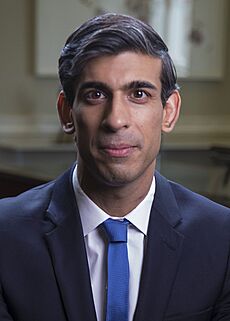
When the COVID-19 pandemic spread in 2020, Sunak played a key role in the government's financial response. He introduced major schemes to help people and businesses.
- Furlough Scheme: This program, officially called the Coronavirus Job Retention Scheme, paid 80% of employees' wages if their employers couldn't keep them working due to the pandemic. It helped prevent many job losses.
- Eat Out to Help Out: In summer 2020, this scheme offered discounts on food and soft drinks at restaurants, cafes, and pubs. The government paid half the cost, up to £10 per person, to encourage people to support the hospitality industry.
Cost of Living Crisis
In 2022, the UK faced a cost of living crisis, with energy prices rising. Sunak introduced a support package, including a discount on energy bills for every household and extra payments for low-income households, pensioners, and people with disabilities.
Budgets and Financial Plans
As Chancellor, Sunak presented several budgets and financial plans. These included measures to help the economy recover from the pandemic and to address rising costs. For example, in March 2021, he announced an increase in corporation tax for businesses.
Resignation as Chancellor
On 5 July 2022, Sunak resigned as Chancellor. He stated that he believed the government should be run "properly, competently and seriously" and that his approach was too different from the Prime Minister's. His resignation, along with others, led to Boris Johnson's resignation as Prime Minister.
Conservative Leadership Bids
After Johnson resigned, Sunak ran to become the new leader of the Conservative Party. He promised to "restore trust, rebuild the economy and reunite the country." He made it to the final two candidates but lost to Liz Truss in September 2022.
However, Truss's time as Prime Minister was short. She resigned in October 2022 after her economic plans caused financial instability. Sunak then ran again for the leadership. This time, he was the only candidate who received enough support from MPs, and he became the new leader of the Conservative Party on 24 October 2022.
Prime Minister (2022–2024)
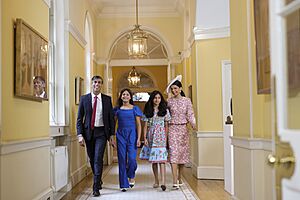
On 25 October 2022, Charles III officially appointed Rishi Sunak as Prime Minister. At 42 years old, he was the youngest Prime Minister in over 200 years and the first British Asian to hold the office. In his first speech, he acknowledged that "some mistakes were made" by the previous government and promised to bring "integrity, professionalism and accountability" to his government.
Government Team
Sunak chose his team of ministers, known as the Cabinet. Key appointments included Jeremy Hunt as Chancellor of the Exchequer and Dominic Raab as Deputy Prime Minister. He also made changes to government departments to focus on areas like business, energy, and science.
Foreign Policy
- Northern Ireland: In February 2023, Sunak reached an agreement with the European Union called the Windsor Framework. This deal aimed to improve trade arrangements for Northern Ireland after Brexit.
- Immigration: Sunak continued the Rwanda asylum plan, which aimed to send asylum seekers who arrived illegally in the UK to Rwanda for processing. The plan faced legal challenges, but Sunak worked to pass new laws to make it happen.
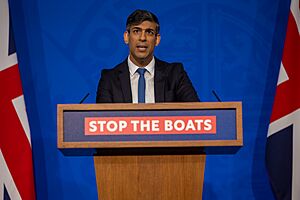
- Russia and Ukraine: Sunak strongly supported Ukraine following the Russian invasion. He visited Ukraine and pledged significant financial and military aid, including weapons and drones.
- Israel and Palestine: After the attack on Israel in October 2023, Sunak pledged the UK's support for Israel's right to defend itself. He later called for a "sustainable ceasefire" in the Gaza Strip to allow humanitarian aid and for hostages to be returned.
Local Election Results
During his premiership, the Conservative Party faced challenges in local elections. In May 2023 and May 2024, the party lost many local council seats. These results showed that the Conservatives were still struggling to gain popularity after previous government issues.
2024 General Election and Resignation
On 22 May 2024, Sunak announced that a general election would be held on 4 July 2024. He hoped that improving economic figures would help his party. During the campaign, he focused on stabilizing the economy, the Rwanda plan, and strengthening pensions.
However, the Labour Party, led by Keir Starmer, won the election by a large margin. This ended 14 years of Conservative government. Sunak conceded the election on 5 July 2024. In his resignation speech, he apologized to Conservative voters for the heavy defeat and announced he would step down as party leader once a new leader was chosen.
After Being Prime Minister (2024–Present)
Leader of the Opposition (July–November 2024)

After the election, Sunak became the Leader of the Opposition. This meant he led the main party that was not in government. He formed a "shadow cabinet" with other Conservative MPs, who would challenge the new government's policies. He remained in this role until Kemi Badenoch was elected as the new Conservative Party leader in November 2024.
Other Activities
Since leaving his leadership roles, Sunak has taken on new positions. In January 2025, he became a visiting fellow at Stanford University. In March 2025, he and his wife started a charity called The Richmond Project, which aims to improve math skills for children and adults. In July 2025, he returned to Goldman Sachs as a senior advisor.
Political Views
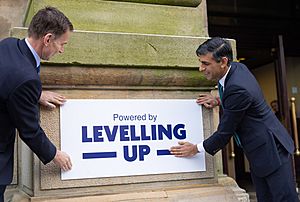
Rishi Sunak is often seen as a moderate within the Conservative Party. He is known for his practical approach to politics. While he shares some ideas with former Prime Minister Margaret Thatcher, he is considered less focused on extreme economic freedom than some other politicians.
He has been described as someone whose background might suggest a more modern view, but his policies on social issues and immigration are often seen as traditional.
Personal Life
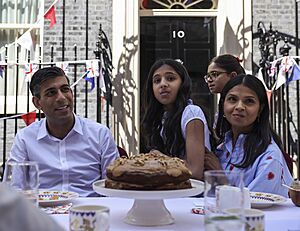
In 2009, Rishi Sunak married Akshata Murty. They met while studying at Stanford University. Akshata's father, N. R. Narayana Murthy, founded the technology company Infosys. Sunak and Murty have two daughters, born in 2011 and 2013.
The family owns several homes, including one in North Yorkshire and apartments in London and California. In April 2022, Sunak received a fine for attending a gathering during COVID-19 lockdown rules, for which he apologized. In January 2023, he also apologized for not wearing a seat belt in a moving car, which resulted in another fine.
Sunak is a fan of Southampton F.C. (a football club) and enjoys cricket and horse racing. He is a Hindu and identifies as British Indian, taking his oath as an MP on the Bhagavad Gita, a Hindu holy book. During the coronation of Charles III, Sunak gave a reading from the New Testament.
Interesting Facts About Rishi Sunak
- Rishi is the oldest of three children. His brother is a psychologist, and his sister works for the United Nations.
- He used to drink a lot of Coca-Cola when he was younger.
- He is a big fan of Southampton F.C., a football club. He once said his dream job would be to run the club.
- When he took his oath as an MP, he used the Bhagavad Gita, a Hindu holy book.
- He has a Labrador dog named Nova.
- He enjoys cricket and horse racing.
- As Chancellor, he liked to work out early in the morning using a Peloton bike.
- Rishi Sunak is a Hindu and identifies as British Indian. He feels "thoroughly British" but also values his Indian heritage.
- During the coronation of Charles III, Sunak read a passage from the New Testament.
Images for kids
-
Sunak holding a commemorative coin of Mahatma Gandhi, November 2021
-
Sunak (right) pictured with Boris Johnson (left), March 2020
See also
 In Spanish: Rishi Sunak para niños
In Spanish: Rishi Sunak para niños
- Electoral history of Rishi Sunak
 | Precious Adams |
 | Lauren Anderson |
 | Janet Collins |


